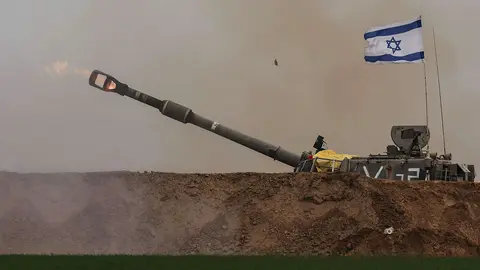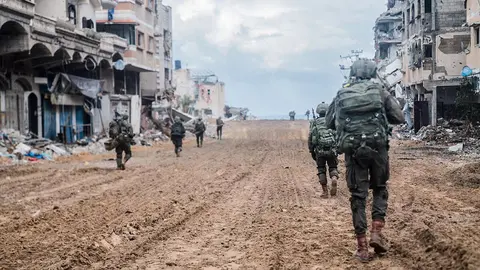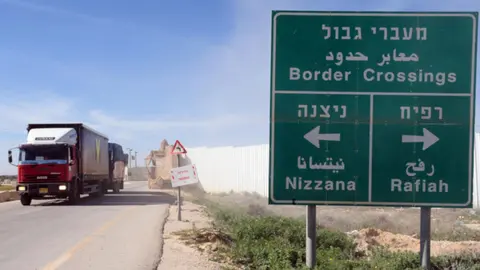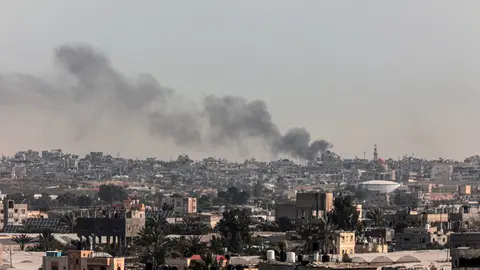Israeli troops return to northern Gaza amid Rafah offensive

- Rafah raid chills Israel-US ties
- "We do not believe that what is happening in Gaza is genocide"
- UN reviews death toll figures provided by Hamas
The Israel Defense Forces have resumed operations in the northern Gaza Strip, from which most troops withdrew a few months ago, following an attempt by Hamas to reorganise in the area.
Israel has described this return to the north as part of a "mopping up" phase aimed at preventing Hamas fighters from returning and recapturing the area. The IDF, based on intelligence information, identified "the presence of terrorists and the restoration of Hamas' terrorist infrastructure in the area".
Following attempts by Hamas to reassemble its terrorist infrastructure and operatives in Jabaliya, the IDF has called on the civilian population of Jabaliya and the surrounding areas to temporarily evacuate to shelters in western Gaza City. This is being done in accordance with… pic.twitter.com/20TFn9A24s
— Israel Defense Forces (@IDF) May 11, 2024
Israeli army operations have focused primarily on Zeitoun and Jabalia, from where civilians were ordered to evacuate. Subsequently, the Israeli air force struck up to 30 Hamas targets. The Gaza Ministry of Health - controlled by the terrorist group - has reported the deaths of at least 20 Gazans as a result of these air strikes.
In addition, the IDF, in cooperation with the Shin Bet intelligence service, has eliminated Naim Ghoul, a senior member of Hamas' Shati battalion. Ghoul was also involved in launching missiles into Israel and was in charge of guarding hostage Noa Marciano in Gaza.
In a joint operation by the Shin Bet and the IDF last Friday, Naim Ghoul, a military operative in Al-Qassam Brigades in the Shati Battalion in the Gaza Strip, was eliminated. pic.twitter.com/KWprDeZVvz
— War Watch (@WarWatchs) May 12, 2024
Marciano, an Israeli army corporal, was abducted on 7 October and subsequently killed in Al-Shifa hospital, from where Israeli troops recovered her body in November.
The IDF has eliminated the terrorist who held Noa Marciano hostage. Noa was abducted on Oct 7 and later murdered at Gaza’s al-Shifa Hospital.
— Aviva Klompas (@AvivaKlompas) May 12, 2024
The terrorist who held her was Naeem Ghoul. A reminder that it may take time, but Israel will hunt down every person who participated in… pic.twitter.com/YwvKrgSD0D
Regarding the return of Israeli troops to Gaza, IDF Chief of Staff Lieutenant General Herzi Halevi has stressed to Israeli media the need to develop a post-war strategy in the Palestinian enclave.
More than 100 targets were struck by Israeli Air Force fighter jets, drones, and helicopters across the Gaza Strip over the past day, the military says, as fighting continues in Rafah, Zeitoun, and Jabaliya.
— Emanuel (Mannie) Fabian (@manniefabian) May 14, 2024
The IDF says troops of the 401st Armored Brigade and Givati Infantry… pic.twitter.com/7D8G9A4MSm
"As long as there is no diplomatic process to develop a governing body in the Gaza Strip other than Hamas, we will have to launch operations again and again in various places to dismantle the infrastructure," Halevi told Channel 13.
Several countries, including the United States, have called for the Palestinian Authority in the West Bank to take control of Gaza in order to come up with a post-war plan. However, Israeli Prime Minister Benjamin Netanyahu has refused, arguing that he will not allow a terrorist-supporting executive to rule the Palestinian enclave.
Rafah raid chills Israel-US ties
As the IDF returns to northern Gaza, at the opposite end of the territory, in Rafah, Israeli troops continue their offensive, intensifying air and ground attacks.
After ordering the evacuation of civilians from the east of the city last week, Israel has now urged citizens in the central areas to flee the fighting. Many of these people are displaced from elsewhere in Gaza who have found refuge in the south. According to UNRWA, the UN agency for Palestinians, more than 450,000 Gazans have left Rafah in recent days.
Empty streets in #Rafah as families continue to flee in search of safety.@UNRWA estimates that nearly 450,000 people have been forcibly displaced from Rafah since 6 May.
— UNRWA (@UNRWA) May 14, 2024
People face constant exhaustion, hunger and fear. Nowhere is safe. An immediate #ceasefire is the only hope pic.twitter.com/cwRWL6iF06
The operation in Rafah, considered the last bastion of Hamas and where many of the hostages are believed to be held, has increased divisions between Israel and its main international ally, the United States.
President Joe Biden's administration has repeatedly criticised Israel's military operation in Gaza in the past. However, with the entry of troops into Rafah, Washington has increased pressure on Jerusalem, urging it not to extend the offensive, to protect civilians and not to hinder the entry of humanitarian aid.
For the moment, Washington considers the Israeli incursion into Rafah "acceptable", as "so far it has not reached the area where the disagreements are", Jack Lew, the US ambassador to Israel, told Channel 12.
The Israeli military announced the opening of the Western Erez Crossing. The opening of the crossing is a part of a broad effort to increase aid to the Gaza Strip. pic.twitter.com/sjYtA97wPd
— Joe Truzman (@JoeTruzman) May 12, 2024
The Rafah operation has prompted the US, for the first time since the Israel-Hamas war began, to suspend some arms shipments to the Jewish state.
In addition to military pressure, the US has offered information on Hamas's secret tunnels and the whereabouts of the terrorist group's leadership in exchange for Israel's withdrawal from Rafah, according to The Washington Post. In this regard, White House National Security Council spokesman John Kirby has qualified that such information is already being handed over to Israel.
Yahya Sinwar, the Hamas leader in Gaza, is Israel's main target. A few months ago, Sinwar was thought to have fled to Rafah via a humanitarian convoy. However, several sources have confirmed to The Times of Israel that Sinwar is not in the southern city, but is hiding in tunnels in the Khan Younis area.
קרבות פנים אל פנים במעבר רפיח, הפעולה בג'באליה הורחבה | תיעוד מהלחימה ברצועהhttps://t.co/osfVHyxStC
— החדשות - N12 (@N12News) May 14, 2024
צילום: דובר צה"ל pic.twitter.com/xFhKdkcUR5
For his part, Netanyahu has spoken out about the tensions between his country and the United States, saying that these cries make it "more difficult" to free the hostages, many of whom are US nationals.
The Israeli leader, during an interview on the podcast Call Me Back, also stressed that this situation does not "help stabilise the Middle East". "It helps Iran and its henchmen, which means we have to exert even more pressure," he added.
"We do not believe that what is happening in Gaza is genocide"
Amid disagreements, US national security adviser Jake Sullivan has reiterated Washington's desire for Hamas to be defeated and noted that President Biden does not believe Israel is committing genocide in Gaza.
"We do not believe that what is happening in Gaza is genocide. We have firmly rejected that assertion," Sullivan said during a press conference.
US national security adviser Jake Sullivan said that President Joe Biden's administration does not view the killings of Palestinians in Gaza by Israel in its war with Hamas as 'genocide’ https://t.co/AifiyH9qqB pic.twitter.com/Uo1gzAZn1m
— Reuters (@Reuters) May 14, 2024
The national security adviser also expressed his rejection of the attacks by several Israeli citizens on humanitarian aid trucks at the Erez crossing to Gaza. "This is totally and utterly unacceptable behaviour," he said.
Sullivan's remarks on the Gaza genocide allegations come after Egypt announced that it will support South Africa's case against Israel at the International Court of Justice.
Cairo, meanwhile, has been criticised for refusing to open its borders to allow Gazans to escape the fighting in Gaza. Indeed, the Egyptian authorities have stepped up border defences, deploying more soldiers and fortifying the wall separating Egypt from Gaza.
Israel has driven Hamas from the Egypt-Gaza border and taken control of the corridor. pic.twitter.com/eipa1ixfbO
— Aviva Klompas (@AvivaKlompas) May 7, 2024
UN reviews death toll figures provided by Hamas
The accusation of genocide against Israel is based primarily on the high number of civilian casualties reported by the Hamas-controlled Gaza Ministry of Health. According to its count, more than 35,000 people have died since the war began. However, Israel rejects these figures and accuses Hamas and its agencies in Gaza of lying and inflating the numbers.
Recently, the UN Office for the Coordination of Humanitarian Affairs (OCHA) has revised its data on the number of Palestinian casualties in the Gaza war, almost halving the number of women and children killed.
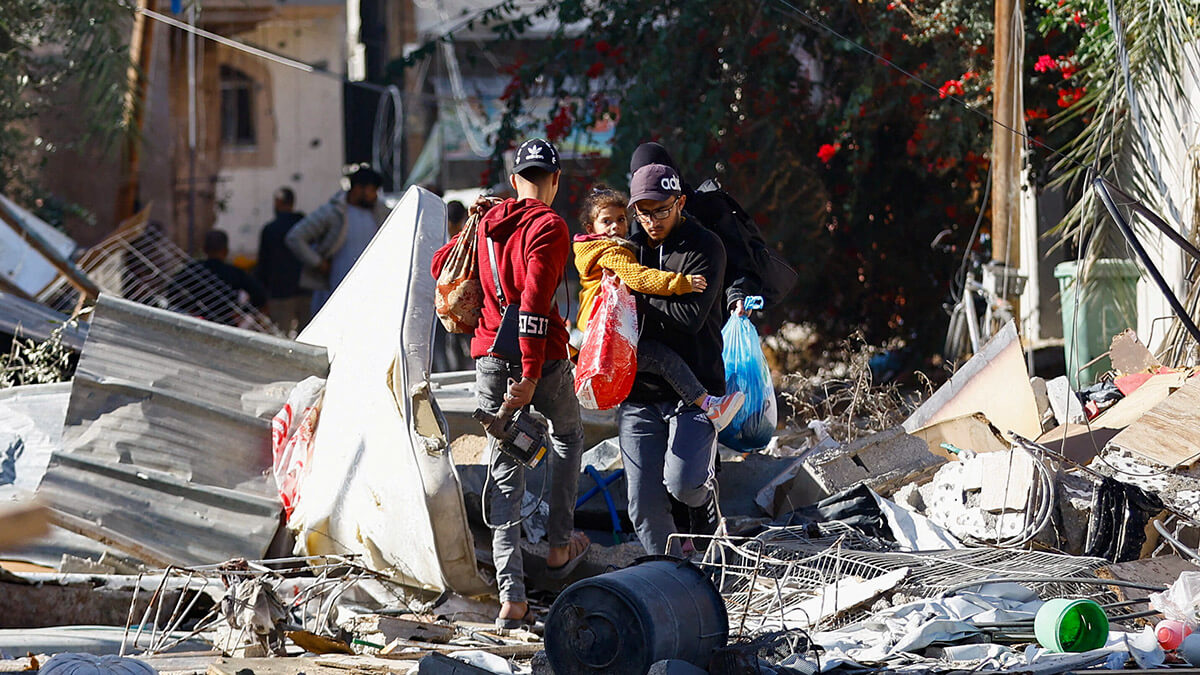
"Parrotting Hamas propaganda messages without any verification process has proven time and again to be methodologically flawed and unprofessional," an Israeli official told Fox News after the OCHA report.
"Israel has repeatedly said that the figures coming out of Gaza and echoed by UN agencies are being manipulated by Hamas, are not accurate and do not reflect the reality on the ground," he added.

